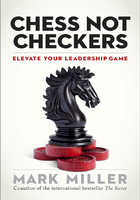
第2章 Introduction
Leading has never been easy. From our first experiment trying to get our classmates to follow us or receiving our first official assignment at work, leadership has always demanded our best effort. That hasn't changed-but something else has: the complexity of the problems we face and the organizations we lead has increased exponentially.
Perhaps this complexity finds its energy in the scope of your enterprise, or it may merely be a function of increased volume. These are great problems to have … if leaders can orchestrate an appropriate response.
Unfortunately, for many leaders, our past successes just don't translate. The game has literally changed before our eyes. The methods that worked extremely well in the past no longer have the same effect. In many cases, the tried and true has become the tired and tarnished.
Most of us began our leadership journey utilizing an approach with striking similarities to the game of checkers, a fun, highly reactionary game often played at a frantic pace. Any strategies we employed in this style of leadership were limited, if not rudimentary. The opportunities in our world for leaders to play checkers and be successful are dwindling.
The game today for most leaders can better be compared to chess-a game in which strategy matters; a game in which individual pieces have unique abilities that drive unique contributions; a game in which heightened focus and a deeper level of thinking are required to win.
Although Chess Not Checkers provides a rich metaphor for leaders, it is much more than that. The game of chess contains four specific parallels that can inform and transform any organization seeking new levels of performance. I've positioned each of these ideas as a "move" your organization can make to draw closer to your goals. Collectively, these moves can be your blueprint for sustained high performance.
I hope this simple story will resonate with you. The company Blake leads is not real, although the situations he faces are as relevant as today's news. I've intentionally omitted details about his organization, leaving it largely nameless and faceless. Hopefully, this approach will make it easier for you to think about your own organization. Is it possible you may be playing checkers when the game is chess? If that is your situation, today can be the day you start learning a new game.
It's your move!